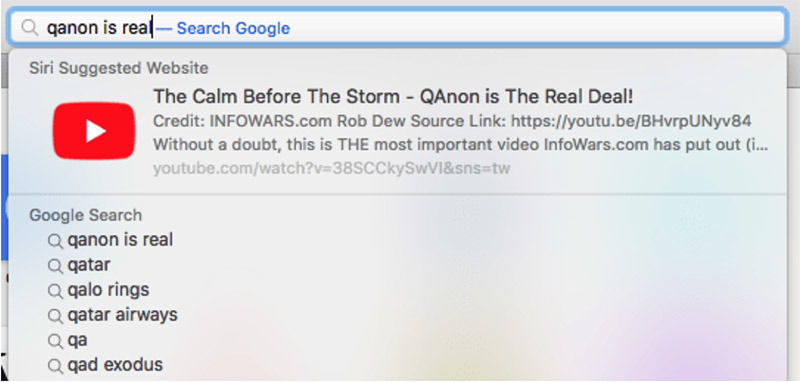Apple this week removed references to questionable online content from Safari's "Siri Suggested Websites" feature after an investigation found the service surfacing articles and video relating to conspiracy theories, "fake news" and other sensationalist items.
As recently as yesterday, Safari would prominently display links to "low quality" websites, YouTube videos and other sources of unreliable information when initiating a search related to popular conspiracy tropes like "Pizzagate" and QAnon, BuzzFeed reports.
Like other web browsers, Apple's Safari autocompletes search suggestions for user convenience. The feature, dubbed Siri Suggested Website, not only completes search bar input, but guesses user intent to deliver a link to a webpage. These suggestions are displayed above search engine results in a dropdown menu.
For example, BuzzFeed saw a search for "Pizzagate" surface the YouTube video "PIZZAGATE, BIGGEST SCANDAL EVER!!!" from conspiracy theorist David Seaman. The video did not play as Seaman's channel was taken down for violating YouTube's terms of service, but its standing as a Siri Suggested Website brings Apple's algorithms into question.
Other examples of questionable suggestions spotted by the publication relate to QAnon, Holocaust deniers, racist propaganda, anti-vaccine misinformation and links to Alex Jones' Infowars site. In one test, the term "Hillary Clinton murder" returned a Siri Suggested Website dedicated to detailing an alleged FBI cover-up of the death of former White House counsel Vince Foster.
After being presented with BuzzFeed's findings, Apple removed reference to the low-quality pages. As of this writing, a search for "Pizzagate" now directs users to a "Siri Knowledge" suggestion for a Wikipedia entry on the Pizzagate conspiracy theory.
"Siri Suggested Websites come from content on the web and we provide curation to help avoid inappropriate sites," Apple said in a statement. "We also remove any inappropriate suggestions whenever we become aware of them, as we have with these. We will continue to work to provide high-quality results and users can email results they feel are inappropriate to applebot@apple.com."
In the current climate of "fake news," and the proliferation of misinformation thanks to social media and sites like Infowars, tech companies have come under increasing pressure to become information gatekeepers. This is especially true with firms fielding web browsers and search engines.
Google is a prime example of the movement. The company has in the past faced criticism for algorithmically promoting unseemly websites, specifically those run by Holocaust deniers. Apple is now coming under the same scrutiny in its practices.
According to the report, the issue is due in part to a "data void" surrounding certain search terms. When a term lacks "natural informative results," those looking to manipulate the system can cobble together websites to fill the void, thereby gaming suggestion algorithms used by Apple and Google.
Beyond Safari, Apple is looking to combat fake news through its News App, an in-house news aggregator that has become a focus for the company over the past year. Though it does not have a clear answer to fake news, Apple's internet services chief Eddy Cue early last year said it is the onus of all companies in the technology and services industries to ensure the problem does not spread.
"Since the vast majority of news is now being read through devices, and through services that are provided through those devices, then I do think that we all have a responsibility for it," Cue said.
Editor's note: Due to its political nature, comments for this article have been disabled.
 Mikey Campbell
Mikey Campbell








 Charles Martin
Charles Martin

 Malcolm Owen
Malcolm Owen
 William Gallagher
William Gallagher

 Christine McKee
Christine McKee
 Wesley Hilliard
Wesley Hilliard









There are no Comments Here, Yet
Be "First!" to Reply on Our Forums ->